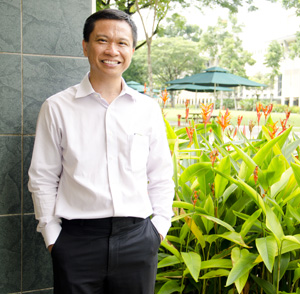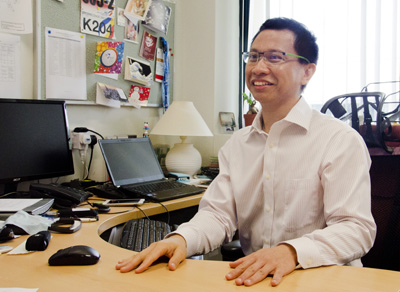Young Children’s Voices in Mathematical Problem Solving
Contributed by Dr Ho Siew Yin and Sng Wei Qin Abbie, from NTUC First Campus, for SingTeach Virtual […]
Read More
Why, indeed, when teachers are already busy teaching and managing their classrooms? Our Guest Editor Dr Hairon Salleh counts the ways research can help teachers face new challenges and become better practitioners.
 Have you heard of the analogy of how the classroom is like a black box? So many inputs, such as teaching strategies, teaching resources, curricula and assessment tasks are earnestly fed into the box, and it is hoped that what comes out will be positive student learning outcomes.
Have you heard of the analogy of how the classroom is like a black box? So many inputs, such as teaching strategies, teaching resources, curricula and assessment tasks are earnestly fed into the box, and it is hoped that what comes out will be positive student learning outcomes.
But what is happening in the black box? For outsiders such as parents and the general public, it’s often difficult to tell.
More interestingly, it may be challenging for teachers as well. This is because the classroom is, if anything, a dynamic place. With so much going on at any given time, how can teachers be sure that what they’re doing is making positive impact on students’ learning?
“When it comes to teaching, it cannot be left to a certain magic formula,” says Dr Hairon Salleh, an Assistant Professor at NIE.
Every classroom is different. It is this complexity in which they operate in that provides a compelling reason for teachers to look more closely into their own teaching practice. One way for them to do so is to conduct research, right in their own classroom.
“When a teacher knows whether and why the teaching is effective, I think the teacher will be a happier teacher, really. Because then, you can start to make improvements,” Hairon notes.
This need to find out whether a teaching practice is effective has become more urgent, because student outcomes are now more wide-ranging.
When a teacher knows whether and why the teaching is effective, I think the teacher will be a happier teacher, really.
– Hairon Salleh, Policy & Leadership Studies Academic Group
“When you think of a broadened set of learning outcomes, you need to broaden your pedagogies,” says Hairon.
Increasingly, teachers find themselves faced with new and novel demands, with no right or existing models to guide them.
Instead of reusing the same old teaching strategies that have worked in the past, they may have to come up with innovative ways of teaching. Not only that, teachers are also encouraged to come up with their own curriculum initiatives.
“More and more so, school leaders and teachers want to know, really, how effective these approaches are,” says Hairon. “You’re doing something new here, you’re doing something creative here, you’re doing something innovative – does it really bring about any benefit to our students?”
“That’s one reason why teacher research has gained popularity.”
Hairon dubs teachers the “superheroes in the classrooms” because of the challenging and ever-changing nature of the work they do every day. But to stay adaptable, even these superheroes have to learn, unlearn and relearn.
“The need for professional development is important,” he says. “The advantage of teacher research is that it brings teacher learning and teaching really close together.”
When teachers attend workshops and seminars and hear about new teaching ideas, they would be thinking to themselves: “How do I translate this in my classroom?” More often than not, something gets lost in the translation.
The difference with teacher research, says Hairon, is that it is embedded in teaching practice, and the application is immediate. The teachers continually learn as they teach.
“While they are thinking through the pedagogies that support their teaching, they’re also improving the classroom in a very simultaneous and seamless way. They’re not regarded as separate – that’s the advantage,” he explains.
Another way research can help teachers in their work is how it clarifies – and even challenges – their own beliefs and assumptions about teaching and learning. This happens very early on in the research process, when they are formulating their research questions.
“By doing it, you’re surfacing your assumptions up front and that in itself is sharpening your epistemology,” says Hairon. “It’s not just about your research skills. It also sharpens how you support your beliefs and assumptions on effective teaching.”
 Research with Rigour
Research with RigourTo Hairon, teachers do research for a different reason in contrast to academics.
“The objective in academic research is to produce new knowledge but for most teachers doing research, the purpose is to improve practice while being informed by theory at the same time. When they do literature review, they don’t have to be exhaustive. The purpose is to look for literature that pertains specifically to the classroom teaching strategy that they wish to try or explore,” Hairon explains.
Teachers don’t have to feel intimidated by the prospect of venturing into research. There are different levels of complexity, and Hairon’s advice is to start small.
“Starting small is important. You do something manageable and within your limits, whether in terms of your sample size or the research method and design that you choose. If you’re comfortable with qualitative, you do qualitative. If you’re comfortable with quantitative, do quantitative.”
However, teacher research need not be less rigorous or objective than that of the academic variety. Hairon advises teachers to follow the steps of doing research (e.g., setting the research problem, exploring the literature, establishing the research question) as closely as possible.
“For example, if interviewing is chosen as the data-collection method, you should specify the details on the ‘who’, ‘when’ and ‘how’, and ‘what’ was found. If single group pre- and posttests were done, specify the test details, scores, mean, standard deviation, and t-test results, if any,” he says.
As long as every step is done systematically, your research would have met the criterion of rigour.
The idea of teachers doing research will only be sustainable if teachers themselves want to embark on it. Here, the school leadership plays a very important role in enabling them to do so. Hairon, who studies educational leadership in Singapore, advises school leaders to build capacity through appropriate professional development.
Instead of action research workshops that last only a couple of days, teachers may benefit more from having an external consultant or teachers with experience in teacher research to guide them along every step of the research process. In this way, they can get “just-in-time” help as and when they need it, be it in reviewing the literature or choosing a suitable research design for their research project.
Research is something that takes time to learn and do, so teachers shouldn’t feel like they have to rush into it at full speed, says Hairon. “Research is learning by doing. It sounds logical. For example, if you want to learn how to drive, I can’t just give you a 2-day workshop, because your skill needs time to develop.”
The same certainly applies to research. But for teachers who’re curious to uncover what is in their black box, research would surely be a worthwhile endeavour.
The advantage of teacher research is that it brings teacher learning and teaching really close together.
– Hairon on the benefit of doing research